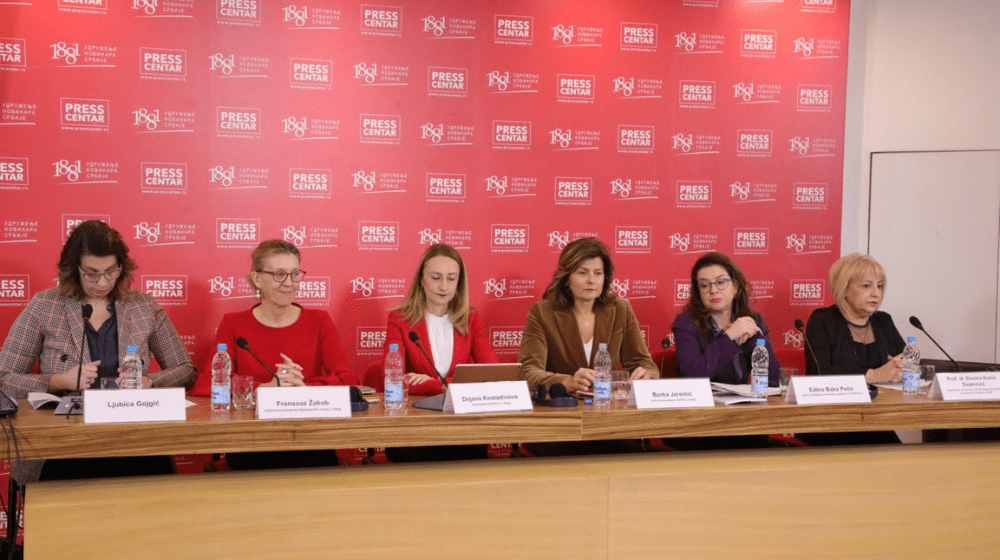Belgrade, 26 January 2023 – New research has revealed that vulnerable and marginalized population groups in the Republic of Serbia are facing distinct challenges resulting from both the COVID-19 pandemic and the Ukrainian crisis.
Poverty projections for the most vulnerable population categories in Serbia - families with children and older persons – were presented today by UNFPA, UNICEF, UNHCR and the UN Resident Coordinator’s Office as part of the Joint United Nation’s Programme “Extending Social Protection to Families in Serbia with Enhanced Shock-Responsiveness” which is mainly funded by the UN Joint SDG Fund.
Bearing the brunt of the crises are families with young children, particularly those with more than four household members, older persons living alone or in older households, refugees, asylum seekers, persons at risk of statelessness and internally displaced persons, those living in rural or remote areas, or with a minimum income.
“This joint project, implemented in close cooperation with the Serbian Government, is a call to strengthen social protection services and systems, especially at a time when we are facing rising costs. It is essential that social protection systems are correctly targeted, so that those who are more vulnerable can receive the necessary support to have a safe and productive life. Our shared goal is to reduce inequalities,” said Francoise Jacob, UN Resident Coordinator in Serbia.
Research shows that poverty does not affect all households in the same way. In fact, households with children are among the most vulnerable in Serbia.
“Child poverty figures for 2022 are expected to show an increase from 10.6% to 13.8%, representing an additional 27,987 children living below the absolute poverty line. The most vulnerable are children living in large families, those in rural households and in Roma settlements. To effectively protect children from poverty, comprehensive social policy measures and budgets are needed. The response should move away from blanket coverage to a poverty-targeted and child-focused approach. Both an increase in coverage and the adequacy of financial assistance programmes, including child allowance, are needed in order to meet the current and future needs of children,” said Deyana Kostadinova, UNICEF Representative in Serbia.
A separate research, covering poverty projections for the older persons, shows that particularly those living in rural and remote areas are stretched in meeting their needs for food, hygiene, or medicines.
“Our latest results indicate that the rate of absolute poverty in 2022 has increased to 12.3% for the entire population, and a similar trend was recorded for the population over 65 and equals 10.3%, which is an increase compared to the data from 2020 when it was 6.8%. As part of the project, UNFPA distributed one-time financial assistance to around 70, mostly single-member elderly households, and from discussions with the beneficiaries, we received comments that this type of assistance should be organized more often,” said Borka Jeremic, Head of the UNFPA Office in Serbia.
Social protection is a key policy tool for building resilience, combating poverty and improving economic and social outcomes among migrants, refugees, and asylum seekers. It can protect people from life-cycle contingencies and external shocks that might otherwise cause them to fall into poverty.
“With the efforts to improve the situation of all the vulnerable groups in the Serbian society, we must jointly ensure that the forcibly displaced, internally displaced and stateless persons not be left behind. The improved access of these groups to personal documents, healthcare, social protection and assistance is of paramount importance. The UN Refugee Agency, along with the other UN agencies, stands ready to support the Government in these efforts,” said Edlira Baka Peco, UNHCR Community-based Protection Officer.
Through this UN Joint Programme, support has been provided to the Government of Serbia to strengthen the national social protection and shock-responsive policy framework and increase adequate budget resources for the protection of the most vulnerable population groups.
“Poverty has lifelong consequences, which are often passed from generation to generation; however, it is neither inevitable nor immune to concerted efforts. Through consistent attention and coordinated action, it can be reduced and even eradicated. The United Nations agencies involved in the implementation of the project stand ready to further support the Government of the Republic of Serbia to empower vulnerable populations living in poverty,” said Dr Slavica Djukic Dejanovic, Special Advisor for the Implementation of the Agenda 2030, the Government of the Republic of Serbia.
About the project:
UN Joint Programme Extending Social Protection to families in Serbia with enhanced shock-responsiveness focuses on strengthening shock-responsive social protection system to mitigate the socio-economic impacts of the consecutive crisis that hit the country.
Its aim is to (i) strengthen the data response on the impact of the crisis on the most vulnerable groups to feed into the introduction of legislative changes for adaptive social protection system (ii) apply the shock-responsive social protection principles to provide support for the 170 most vulnerable families The project is implemented jointly by UNICEF (lead agency) and UNFPA, with the participation of UNHCR and in close partnership with the Special Advisor to the Prime Minister on Agenda 2030, Ministry of Labour, Employment, Veteran and Social Affairs, other line-Ministries, Local Self Governments, Statistical Office, Red Cross and World Bank. The total project value is $289.200, funded mainly by the UN Joint SDG Fund.


